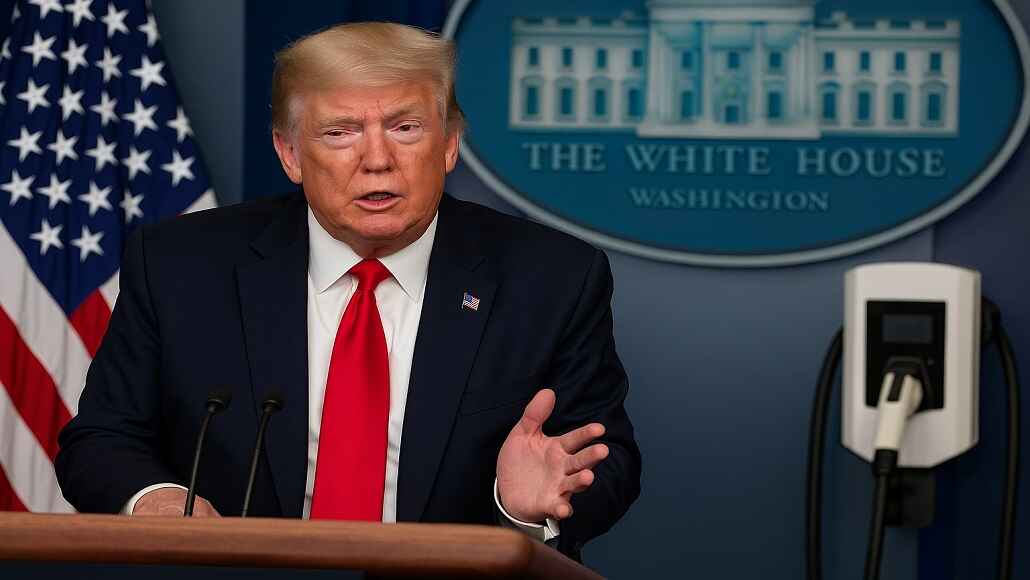The US president, Donald Trump, and his administration recently proposed cutting billions in federal funding next year in 2025 for projects that include renewable energy and electric vehicle charges and, at the same time, gutting programs with an objective at curbing the impacts of climate change.
This proposal to Congress was part of a much broader request to cutting billions in federal funding with slashing $163 billion in 2026 federal spends, thereby cutting more than a fifth of the non-military spending.
The White House says that the energy budget proposal goes on to cancel over $15 billion when it comes to carbon capture and renewable energy funding from the partial infrastructure law, which former president Joe Biden, who happens to be a Democrat, inked in 2021. It also proposes to go ahead and cancel $6 billion coming from the law for EV charges.
As per the White House, the Biden administration went on to spend over three years executing these programs; however, it built only a small number of chargers due to its priorities overregulating as well as climate justice goals. The White House added that EV chargers should be built, just like the gas stations – with private sector resources that are disciplined by market forces.
The plan goes on to reorient the energy department’s funding when it comes to research and development of technologies that go ahead and produce an abundance of oil and gas, coal, and critical minerals, as well as nuclear reactors along with advanced nuclear fuels.
The budget is meant to furnish administration policies and what the lawmakers would ultimately adopt that would often differ from the White House request. It is not immediately clear as to how Congress would go on to agree to cut the funding approved in the bipartisan law, which is, in fact, popular amongst many Republican districts. Congress would rather have to pass the legislation, like recessions or amendments.
The plan would go on to cut $80 million when it comes to interior department renewable energy programs such as offshore wind energy projects.
The budget, if it gets passed, will have a huge impact when it comes to farmers. Cuts to the US Department of Agriculture budget are going to be more than $4.5 billion, which, by the way, is the largest cut from conservation programs that go on to pay farmers to remove land from crop production, research grants, and rural development programs when it comes to water and housing.
As per Senator Patty Murray, who happens to be the top Democrat on the Senate Appropriations Committee, Trump wants to take away funding to safeguard Americans’ health and protect the environment and also help the rural communities as well as farmers to thrive. He added that the plan was very light on details.
The plan would eradicate the McGovern-Dole Food for Education program, Food for Peace, and Food for Progress—the three programs that go on to send US commodities across the world as food aid. It also adds around $100 million when it comes to food safety inspection at the meat plants as well as rural rental assistance.
When it comes to the Environmental Protection Agency, Trump, who himself is a Republican, called for almost a 55% cut as compared to its enacted 2025 budget, thereby reflecting his emphasis on decreasing the regulations and eradicating grants for programs and research when it comes to topics like climate change.
Among the cuts when it comes to the EPA’s budget are $235 billion when it comes to the Office of Research and Development, thereby leaving it with only $281 million to get the research done that is required by the Congress and eliminating any kind of work to advance environmental justice.
As part of cutting billions in federal funding, the budget also goes on to slash $1.3 billion in grants that have been issued by the National Oceanic and Atmospheric Administration, which, by the way, is focused on climate-dominated research and not in sync with the administration’s policies. It also cut down $209 million when it comes to some satellites and cancelled contracts for those instruments that are designed especially for unnecessary climate measurements rather than weather observations.
The CEO of the American Association for the Advancement of Science, Sudip Parikh, said that it is indeed going to be catastrophic if the Congress floats the budget. The United States will no longer be in the global race when it comes to R&D leadership. The fact is that they will have lost it then.










































